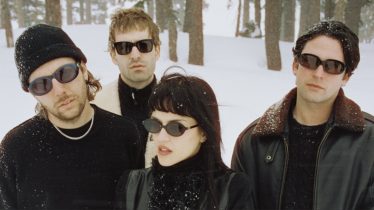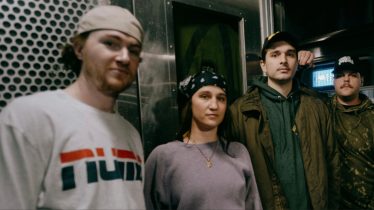Reggae’s New (Rare) Breed
If anyone can tell you about the ups and downs of starting a new label, it’s Vinnie Fiorello. The Less Than Jake drummer and lyricist helped create Fueled By Ramen, one of the world’s most iconic alternative music labels, almost two decades ago. Since then, Fiorello has started two other companies, Sleep It Off and Paper + Plastick, to release a variety of smaller projects.
So why in the world would Fiorello jump into the label-creation game yet again to debut Rare Breed, a reggae and ska-based imprint? He has a ready – and simple – answer to the question. “It’s about passion. Passion for the music, and passion for the power in the message in this music,” says Fiorello during a phone interview. “We forget that a lot of reggae music had a powerful message as well. From my side of it, that’s what I find attractive; that’s what I found attractive about punk rock.”
Fiorello’s partner in the new venture is Obi Fernandez, vocalist of the Boston-based ska band Westbound Train. “I think more than anything it’s a love for this genre of music, a respect for it,” agrees Fernandez. “And really trying to build a place for it. We said, how can we take that respect and honor it, and find a place for it moving forward?”
Adds Fiorello, “This genre would have gotten lost on another label. We wanted to make something very genre-specific.”
The duo is also launching Rare Breed with a very product-specific angle. The label will begin with a subscription series of releases that bring back the flexidisc, the vinyl substitute that was once a favorite giveaway of punk and alternative publications. Featured on those discs will be several artists–including punk veterans Anthony Raneri of Bayside and Rx Bandits frontman Matt Embree–who are teamed in the studio with Fernandez and a crack team of musicians to crank out Jamaican-themed singles. The bimonthly singles subscription costs $30 and comes with a collector’s box–part of the effort to create an artifact fans will snap up.
Fiorello and Fernandez talked exclusively to AP about their new venture, old vinyl and spreading the gospel of reggae and ska.
Reggae and ska–as well as punk and subgenres like Northern Soul–are subcultures that have a well-known singles fetish. Is your focus on single releases an homage to that?
Vinnie Fiorello: I think all the things you mention came from a desire by labels to have stuff out quickly. One thing me and Obi talked about early was the idea of putting music out quickly. When you’re dealing with a full-length format, it becomes a more detailed animal.
Obi Fernandez: It also allows us to put together projects that are very unique. For example, we have Anthony Raneri vocalizing on a track with a band called the Young Ones, and vocalizing on a track from Westbound Train. We get to take guys we’re used to seeing in other settings, and kind of bring them into our world; go into the studio with different musicians and make something completely new, from a sound perspective and from a visual perspective.
Fiorello: Take a guy like Matt Embree from Rx Bandits, or a guy like Anthony Raneri. You don’t usually include them in reggae culture. But the Flexi Project allows us to put them together for a one-of-a-kind experience.
Fernandez: I grew up in the Montclair, New Jersey area. And I didn’t know it at the time, but Buck (Robert “Bucket” Hingley, of the Toasters) from Moon Records, lived one other town over. But I noticed that there was a heavy Moon Records presence at shows—there were guys in bomber jackets, handing out free samples. I just thought that was rad, putting out this subculture music! And later, when I was 16 years old, I was in Buck’s basement, putting shrinkwrap on Moon CDs.
So I think it’s just an homage to the music and to labels like Moon and Hellcat, that just had great release after great release, that had this sound that really changed our worlds.
So why flexidiscs? I assume because they’re cost-effective, but there’s also a tradition, going back to subculture magazines like Trouser Press and Flexi-Pop, of sharing new music via flexi.
Fiorello: It’s about half the amount of money that a 7-inch record would cost. It’s funny that you mention [Trouser Press], because yeah, growing up, you had Flipside magazine, and other punk-rock magazines with this flexidisc in it.
I’d been thinking about flexis for a while…but there’s a press in the Czech Republic. They’ve reworked and revamped the sonics of a flexidisc. A flexidisc now sounds infinitely better than a flexidisc did back in the ’80s or early ’90s. So not only is it cheaper—for me, it’s just a much cooler format.
Rare Breed is focusing on a physical product, which is something a segment of music fans are clearly nostalgic for. How do you reconcile that with the demands of a digital music world, where music is easier than ever to get outside of a physical format?
Fiorello: You can’t stop technology. I love the fact that digital music is portable and accessible. But people still want that physical product, like a vinyl record or a flexidisc. If they like the track they hear, whether it’s on Spotify or iTunes, they’re going to want more. Our bet is that if people hear it and fall in love with it, they’re gonna want the physical product.
So will any of this be digital?
Fiorello: I think with the first release, we’ll make it available to stream…and I think we’ll move into being able to purchase it digitally, a la carte, after the fact.
Have you figured out a target number of subscribers you need to make the Flexi Project viable?
Fiorello: You know what, man–I don’t know. Because things (can change) once you hit a certain number, and then you incur new expenses and adjust your strategy. Obviously we’re starting out with lower numbers, trying to make it more collectible and collector-based. I think that as we move into another spot, the number changes, because of the number of needs and obligations changes with it.
Fernandez: It’s super-clichéd, but again, right now, it’s driven by passion. We’re thinking about, what are the cool things, the fun things we would enjoy as collectors that we can share with other people? And as we move forward, the new analytics will present themselves.
The Flexi Project offers its subscribers the chance to get new reggae and ska music. How do you sell it to the artists you approached?
Fernandez: I think passionate people like to work with other passionate people. Anthony–the Specials are one of his favorite bands. Matt Embree is a huge reggae fan. This also speaks to how universal reggae is among different groups of people. And that’s something Rare Breed wanted to capitalize on, as well.
Will you consider full-length releases at some point?
Fiorello: Me and Obi were actually talking about this. I think we’re gonna get to a full-length…when the time’s right, with the right group of people. Currently, we’re just focusing on where Rare Breed’s gonna start, with the singles and the Flexi Project.
You’ve already recorded tracks with some names pretty familiar to punk, ska and reggae fans, like the Slackers, the Movement, Chris Demakes of Less Than Jake, and Giant Panda Guerilla Dub Squad. What artist or artists would be a good get for Rare Breed in the future?
Fernandez: Jay Malinowski (of Jay Malinowski & The Deadcoast) I love those dudes. I totally fell in love with them when Westbound Train toured with them. And I’d love to do something with Sugar Minot. I love his voice – he’s been around forever, and he’s a reggae icon.
Fiorello: Dicky Barrett from the [Mighty Mighty] Bosstones, with his rough voice, and with that very, very smooth band behind him. That’d be an ultimate get for me.
Mentioning Sugar Minot makes me wonder if there are plans to seek out other Jamaican artists for some of these collaborations?
Fernandez: I definitely would, but it’s tricky. It’d just have to be a great fit. There are a couple of things that I can’t share today that I’m trying to figure out along that line.
Fiorello: I’ll pose the question back to you: it’s not that we don’t want to collide with those artists. But do they wanna collide with us? Because it’s out of the context of how they usually run. We would love that sort of cross-cultural thing to happen. Would they want to have it happen, after hearing what we’re doing? I don’t know.
Obi, you described Rare Breed as an attempt to “find a place” for reggae and ska, moving forward. What can Rare Breed really do to help those genres, though?
Fernandez: What we’re trying to do is bring these non-traditional artists with a passion for reggae, and bring them together with great players in the reggae tradition.
You have to embrace the punk rock guys, the rock guys. That allows you to make the foundation of reggae even more universal than it already is. When you bring those people together, beautiful things happen,
Fiorello: When you light something on fire, you never know how it’s going to catch. I don’t know what the future holds. But that’s what’s exciting.
Sometimes you’re gonna fall. Sometimes you’re gonna win. That’s what happens when you put yourself out there.
Fernandez: Preach it, Vinnie! (laughs)
For more information, visit rarebreedrecordingco.com



